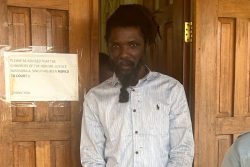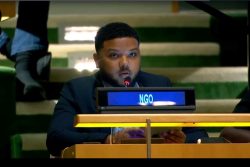The Caribbean Court of Justice (CCJ) will on Thursday, June 28 hear oral arguments in the final appeal of the cross-dressing matter filed in 2010 by Gulliver (Quincy) McEwan, Angel (Seon) Clarke, Peaches (Joseph) Fraser and Isabella (Seyon) Persaud.
In a press statement the Society Against Sexual Orientation Discrimination (SASOD) reminded that the four transgender women are challenging the constitutionality of an 1893 post-slavery vagra-ncy provision under which they and three others were detained, convicted and fined by the then Acting Chief Magistrate following their February 2009 arrest.
Their case will be argued by Senior Counsel Douglas Mendes along with a team of pro-bono lawyers from Guyana, Jamaica and Trinidad and Tobago. This team was convened by the Faculty of Law UWI Rights Advocacy Project (U-RAP) whose mission is to promote human rights and social justice in the Caribbean in collaboration with Caribbean lawyers, civil society organisations and its students.
The law being challenged is Section 153(1)(xlvii) of Part V: Offences Against Religion, Morality and Public Convenience of Guyana’s 1893 Summary Jurisdic-tion (Offences) Act. This regulation makes it an offence for a man “in any public way or public place, for any improper purpose” to appear in female attire, or for a woman, “in any public way or public place, for any improper purpose” to appear in male attire.
SASOD noted that while the provision outlaws cross-dressing for both men and women, charges filed disproportionately affect and criminalize transgender women as they inhibit their freedom of expression in public.
“The 19th century colonial law contravenes Guyana’s Constitution which affords fundamental rights and freedoms of the individual. This case strikes at the heart of plantation colonial rule that sought to restrict the freedom of the individual and promote racial, religious, ethnic and social division amongst Guyanese,” the statement stressed, adding that other offences in the Act include roguery, practising Obeah and witchcraft, flying a kite, beating a mat and grooming an animal on a public way.
The litigants have argued that the 1893 law itself is unconstitutionally vague, engages in sex stereotyping, and disproportionately affects transgender and gender-non-conforming persons. They also argue that the conduct of state officials was unconstitutional.
The matter is integral to the operations of two Non-Governmental Organisat-ions namely Guyana Trans United (GTU) which was formed by McEwan and SASOD.
SASOD which responded to the initial arrests and was originally also an applicant in the proceedings was struck out of the case by the trial judge. This decision also forms part of the appeal.
Those involved in the issue have already recorded two wins. The first occurred in 2013 when Guyana’s then Acting Chief Justice, Ian Chang, ruled that dressing to express one’s identity is not a crime. His ruling however did not resolve the uncertainty surrounding “an improper purpose.”
A second victory was noted in 2017 when the Judicial Service Commis-sion said that the practice of a magistrate who repeatedly refused to allow transwomen with matters before him to enter his courtroom dressed as themselves, violated their right to access the courts and access justice.
The case will stand as a precedent in the interpretation of sections of the Constitution and how it applies international law to human rights.
“Of particular relevance to the rest of the Caribbean is the question of whether the law is “saved” from constitutional challenge [as] the litigants will argue that the Constitution’s “savings law clause” does not prevent the court from reviewing this colonial law,” the statement added.








